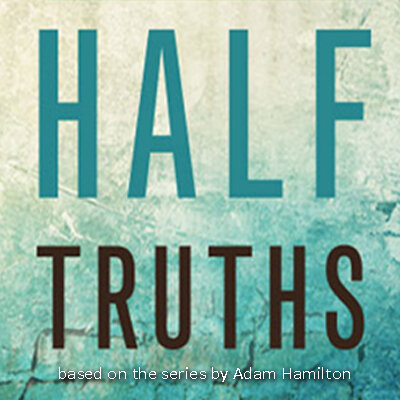¿ God Won't Give You More Than You Can Handle ?
Half-Truths - Part 2
(based on the book by Adam Hamilton)
July 13, 2025
1 Corinthians 10:12-13, 2 Corinthians 12:7-10
see also: James 1:13-17, Psalm 46:1-3, 2 Corinthians 1:8-9
No temptation has seized you that isn’t common for people. But God is faithful. He won’t allow you to be tempted beyond your abilities. Instead, with the temptation, God will also supply a way out so that you will be able to endure it.
1 Corinthians 10:13
_______________
“Don’t worry, God won’t give you more than you can handle.”
Before we dig into what God does and doesn’t give us, let’s first consider the source of this unhelpful cliché. It is an adaptation of the passage above from 1 Corinthians 10:13
The actual statement from 1 Corinthians 10 reads: “God won’t allow you to be tempted beyond your abilities.”
James elaborates on this point when he writes:
No one who is tested should say, “God is tempting me!” This is because God is not tempted by any form of evil, nor does he tempt anyone. Everyone is tempted by their own cravings; they are lured away and enticed by them. Once those cravings conceive, they give birth to sin; and when sin grows up, it gives birth to death.
James 1:13-15
The ability to overcome temptation and the ability to handle any circumstance that comes our way are two entirely different things. God does not tempt us to sin, but he promises that he will give us the strength to resist temptation. The lure of sin does not have power over us if we are walking in the Spirit because we have died to our sinful nature and been raised to walk in the light of Christ. The good news of the gospel, in fact, is not simply the forgiveness of sin so that we can go to heaven, but the power over sin granted to us by the same grace which saved us in the first place.
Clearly the statement, “God won’t give you more than you can handle,” is a misquoted version of this favorite memory verse from 1 Corinthians. But what do we do with the broader idea? It has become so vital to our faith to believe that no matter how bad things get, we will not get overwhelmed because God won’t give us more than we can handle.
This favorite half-truth often follows right behind “Everything happens for a reason” as a second pillar of our “Bumper Sticker Christianity.” In fact, it utterly depends on the idea that everything happens according to God’s plan and that God causes every bad thing to happen. “God won’t give you more than you can handle” implies first and foremost that everything you have to handle, no matter how tragic, must be from God for some greater divine purpose.
If you missed last week’s message, now may be a good time to go back and check out “Everything Happens for a Reason”.
Two key points to keep in mind:
Not every circumstance you have to handle is from God.
It is just as likely that the struggle you face is the result of the natural ebb and flow of life, or perhaps even the result of sinful and destructive choices, whether yours or the harmful choices of others that may have had nothing to do with you at all. Nevertheless, the consequences are very real and painful.
Though we may very well be overwhelmed by circumstances beyond our control, God will see us through any circumstance we face.
This is where we draw hope from the Apostle Paul.
I was given a thorn in my body because of the outstanding revelations I’ve received so that I wouldn’t be conceited. It’s a messenger from Satan sent to torment me so that I wouldn’t be conceited.
I pleaded with the Lord three times for it to leave me alone. He said to me, “My grace is enough for you, because power is made perfect in weakness.” So I’ll gladly spend my time bragging about my weaknesses so that Christ’s power can rest on me. Therefore, I’m all right with weaknesses, insults, disasters, harassments, and stressful situations for the sake of Christ, because when I’m weak, then I’m strong.
2 Corinthians 12:7-10
“God will help you handle all that you’ve been given” (Adam Hamilton).
As he tells Paul, “My grace is sufficient because my power is made perfect in your weakness.”
Take some time to sit with all of the circumstances in your life that overwhelm you. Imagine them circling around you like a storm as you stand with Peter on the water in the middle of the sea. Look up to Jesus and reach out your hand. Invite him to grant you peace, and even if he doesn’t calm the storm, pray that the Holy Spirit might calm the storm in you.
Listen to this week’s sermon above for more on the half truth: “God won’t give you more than you can handle”. For now, let us us pray together with the Psalmist:
God is our refuge and strength,
a help always near in times of great trouble.
That’s why we won’t be afraid when the world falls apart…
Psalm 46:1-2a (CEB)





